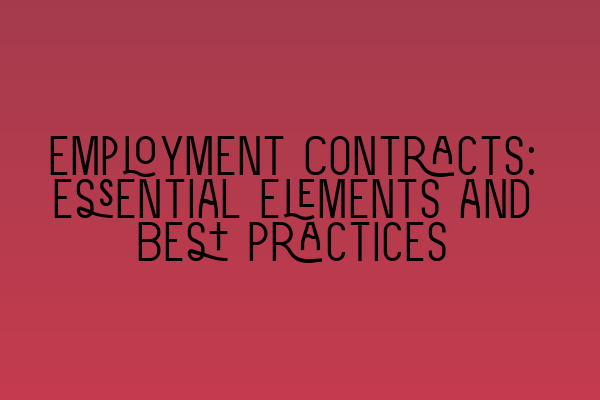Employment Contracts: Essential Elements and Best Practices
Welcome to our blog post on employment contracts. In today’s fast-paced and ever-changing business world, it is essential for employers and employees alike to have a well-drafted and comprehensive employment contract in place. These contracts not only establish the rights and obligations of both parties but also ensure a harmonious and legally compliant working relationship. In this article, we will explore the essential elements of employment contracts and provide some best practices for drafting and implementing them effectively.
1. Clear and Concise Terms
The first and most crucial element of an employment contract is clarity. It is imperative that the contract clearly articulates the terms and conditions of the employment relationship. This includes the job title, job duties and responsibilities, working hours, remuneration, and any specific provisions related to annual leave, sick leave, and other benefits. Clarity in these areas helps avoid misunderstandings and potential disputes in the future.
2. Duration and Termination
Another essential element of an employment contract is defining its duration and termination conditions. The contract should specify whether the employment is for a fixed term or ongoing, and outline the termination procedures for both the employer and the employee. It is crucial to include any notice periods required for termination and the circumstances under which the contract can be terminated without notice. These provisions help protect the rights of both parties and ensure a fair and lawful termination process.
3. Confidentiality and Non-Disclosure
Confidentiality and non-disclosure clauses are vital for protecting sensitive business information. These clauses prevent employees from divulging trade secrets, proprietary information, or any other confidential data, both during their employment and after its termination. The contract should clearly outline the scope and extent of the confidentiality obligations, ensuring that employees understand their responsibilities in safeguarding the employer’s confidential information.
4. Intellectual Property Rights
In many employment contracts, it is important to include provisions regarding intellectual property rights. These clauses clarify who owns the intellectual property created during the course of employment, including patents, copyrights, trademarks, and inventions. By explicitly addressing these rights, employers can avoid disputes over ownership and ensure that the company retains the exclusive rights to any intellectual property developed by its employees.
5. Dispute Resolution
An employment contract should also include a dispute resolution clause to provide a mechanism for resolving any potential conflicts that may arise between the employer and the employee. This clause can outline procedures for negotiation, mediation, or arbitration to resolve disputes in an amicable and efficient manner. By including this provision, parties can avoid costly and time-consuming litigation and seek alternative means of resolution.
6. Best Practices for Drafting Employment Contracts
Now that we have covered the essential elements of employment contracts, let’s discuss some best practices for drafting them:
I. Seek Legal Advice
It is highly recommended to seek legal advice when drafting employment contracts. An experienced solicitor can provide guidance on applicable laws and regulations, help ensure compliance, and tailor the contract to meet the specific needs of your organization.
II. Stay Up-to-Date with Employment Laws
Employment laws are subject to change, and it is essential to stay updated with any new legislation or regulations that may impact employment contracts. Consult legal resources or engage with professional associations to stay informed and ensure your contracts remain legally compliant.
III. Tailor Contracts to Each Employee
While it may be tempting to use a standard template for all employment contracts, it is important to consider the individual circumstances of each employee. Tailor the contract to address their unique roles, responsibilities, and requirements to ensure a fair and effective employment relationship.
IV. Regularly Review and Update Contracts
Employment contracts should not be a one-time exercise. They should be regularly reviewed and updated to reflect any changes in job roles, legislation, or the needs of the organization. Take the opportunity to discuss contract terms with employees during annual reviews or whenever changes occur.
V. Educate Employees on Contract Terms
Lastly, it is crucial to educate employees on the terms and conditions of their employment contracts. Ensure that employees have read, understood, and acknowledged the contract’s provisions. This helps avoid any confusion or disputes down the line and promotes a transparent and well-informed working relationship.
In conclusion, employment contracts are a fundamental tool for establishing and maintaining employer-employee relationships. By including the essential elements discussed in this article and following the best practices for drafting and implementing employment contracts, employers can ensure legal compliance, minimize disputes, and foster positive and productive working environments.
For more information on preparing for the SQE exams, check out these related articles:
